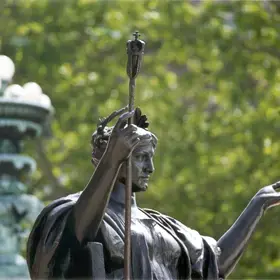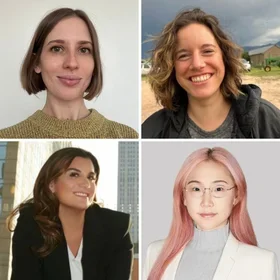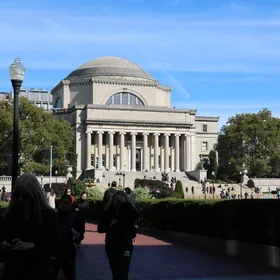This spring, Interim Dean Troy Eggers announced the appointment of the first Chief Diversity Officer of the School of Professional Studies: Erwin de Leon, Ph.D., Lecturer in the Discipline of Nonprofit Management.
In partnership with Dr. de Leon, the School is forming its inaugural Diversity, Equity, Inclusion, and Accessibility (DEIA) committee, which will gather a committee of SPS colleagues dedicated to advancing the University and SPS DEIA goals. The nomination period for the committee is open through May 28th.
We recently spoke to Dr. de Leon to discuss the significance of the position and how he is hoping to engage the School in the coming months.
Tell us about your background as both a faculty member and administrator at the School.
I’m a full-time lecturer in the Nonprofit Management Program and had served as its Deputy Academic Director. I am also a Research Fellow at Knology, a think-tank based here in New York City.
Can you speak to each part of the acronym “DEIA”? Why is each element distinct/important to recognize in an institution?
First, we need to understand that any DEIA initiative has to be grounded in the fundamental belief that each and every one of us deserves to be treated with dignity--that we are born with intrinsic value and worth. That includes feeling a sense of belonging, being heard, and being able to make a difference. Together, the various elements of DEIA provide us a lens through which we see who we are as an organization and a community, how we treat each other, and what we need to do to make sure that each member of our community flourishes.
Diversity refers to the various groups with which we are identified or choose to identify. We usually focus on race and gender, but to fully measure the diversity of our community--students, staff, and faculty--we will need to explore other categories such as sexual orientation, gender identity, physical/cognitive abilities, socioeconomic background, etc. Are these identities and groups, particularly those that have been and to this day remain underrepresented and marginalized, visible and celebrated in SPS?
Equity means that all members of our community are treated fairly and justly in our organizational structures, policies, procedures, and day-to-day practices. Inclusion means that each and every one in our community, especially those who are relegated to the margins, feel welcomed and heard. Beyond words, we should all feel that we have a say in the very decisions that impact us. Finally, Accessibility means allowing full representation and participation to everyone, regardless of physical and cognitive ability.
Through the DEIA lens, we clearly see who we are and who we aspire to be as a community.
What’s a common misconception about DEIA?
A common misconception is that DEIA is primarily about race and gender. This is reflected in the data that is ordinarily collected. To gain a fuller picture of our diversity, we should look at other categories including age, ability, sexual orientation, gender identity, socioeconomic status, and political perspective.
How can students, faculty, and staff get involved in these efforts?
Staff and faculty can participate in DEIA-related committees, from the DEIA committee being formed, to subcommittees and Employee Resource Groups (ERGs). Individuals can also raise concerns and ideas directly to me and the DEIA committee once it has been established. Students and alumni will have representation in the DEIA committee and they too can go directly to the committee and me.
Where do you see the most opportunity in implementing DEIA at SPS? What are some of the School’s biggest challenges?
What energizes me most is the palpable desire and commitment to create change in our community and to make SPS more equitable and inclusive. Individuals and groups have already been working to advance DEIA in our community. I am confident that this official initiative will harness and supercharge all these efforts. That being said, we are a bureaucracy within a bureaucracy and we need to work within established structures and systems. Change will be incremental and patience will be called for.
What types of resources or support networks do you envision for the School?
Resources and support are in place for our students and faculty and I look forward to working with the DEIA committee, the Student Affairs and Academic Affairs teams, Program Directors and programs, faculty members, and others in determining how we can institutionalize DEIA. I would very much like to see more policies, processes, and resources tailored to the needs of SPS’ administrative staff, whose service and hard work allow students to learn and faculty to teach.
What would success look like for SPS and other higher education institutions?
Metrics will signal success: more women, people of color, sexual minorities as well as a community that reflects a range of abilities and include varied backgrounds. Success will be real when students, staff, and faculty feel that they are seen, heard, valued, and can make a difference--when we all feel we belong. This change will ripple outwards, well beyond Lewisohn Hall and Morningside.
How can we, as you have said in the past, bring joy to DEIA efforts at SPS?
While I am energized and confident that together we can create change, I am aware that this the work will be hard, challenging, and at times, painful. We will have to hold ourselves accountable. We will need to take care of each other. However, we can bring joy to our labor by permitting ourselves to laugh often and savor the time invested with like-minded and equally committed friends and colleagues. By choosing not to be cynical and jaded. We can smile knowing that times are changing.
What are you reading for AAPI Heritage Month?
I am reading Minor Feelings: An Asian American Reckoning by Cathy Park Hong. She is able to articulate my experience as a member of the Asian American community. Among the many passages that I’ve underscored is this: “Most Americans know nothing about Asian Americans. They think Chinese is synecdoche for Asians the way Kleenex is for tissues. The don’t understand that we’re this tenuous alliance of many nationalities. There are so many qualifications weighing the ‘we’ in Asian American. Do I mean Southeast Asian, South Asian, East Asian, and Pacific Islander, queer and straight, Muslim and non-Muslim, rich and poor?” I proudly identify as Asian American, but often, I am not perceived as such because I don’t match our society’s notion of who is Asian.


